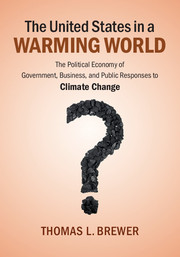 The United States in a Warming World
The United States in a Warming World Book contents
- Frontmatter
- Dedication
- Contents
- List of boxes
- List of figures
- List of tables
- List of maps
- Preface
- Acknowledgments
- Permissions
- Introduction: a chronological overview
- Part I Issues
- Part II Domestic economics and politics
- Part III National government policies
- Chapter 5 Regulating carbon dioxide and other greenhouse gases
- Chapter 6 Facilitating energy technology innovation and diffusion
- Chapter 7 Strengthening international cooperation
- Part IV The future
- References
- Index
Chapter 6 - Facilitating energy technology innovation and diffusion
Published online by Cambridge University Press: 05 October 2014
- Frontmatter
- Dedication
- Contents
- List of boxes
- List of figures
- List of tables
- List of maps
- Preface
- Acknowledgments
- Permissions
- Introduction: a chronological overview
- Part I Issues
- Part II Domestic economics and politics
- Part III National government policies
- Chapter 5 Regulating carbon dioxide and other greenhouse gases
- Chapter 6 Facilitating energy technology innovation and diffusion
- Chapter 7 Strengthening international cooperation
- Part IV The future
- References
- Index
Summary
Here we have a serious problem: America is addicted to oil.…The best way to break this addiction is through technology.
President George W. Bush (2006)We’re faced with the following choices: We can become the leader of a new industrial revolution and lay the foundation of our future economic prosperity…or we can hope the price of oil will go back to $30 a barrel, deny climate change is happening and let other countries take the lead in energy innovation.
Secretary of Energy Stephen Chu (2009)This is our generation’s Sputnik moment.
President Barack Obama (2011)This chapter ranges widely across a variety of questions about the political economy of energy technology issues: In Sections 6.1 and 6.2 basic questions about market failures and government policies are addressed: How do the market failures associated with technological innovation and diffusion differ from those associated with cap-and-trade? How do the benefits and costs of technology policy vary over time and among groups? What are the economic rationales for government policies that facilitate innovation and diffusion of climate-friendly technologies? How do government programs and policies address technology-related market failures? In Section 6.3: What kinds of energy technology subsidy programs are there, and how are they allocated among industries? Section 6.4: What are the elements of the government’s Climate Technology Program, and how have its priorities changed with changes in the administration? Section 6.5 considers questions about budgeting for energy programs: How much is allocated to various programs? How have the absolute and relative amounts for renewable energy and energy efficiency programs varied over time? How is the budget decided? How do congressional “earmarks” affect the funding of energy programs? What were the energy program priorities in the American Recovery and Reinvestment Act (ARRA) that was promulgated in the midst of the financial crisis of 2008–2011? In Section 6.6: What are the central issues about US policies concerning international technology transfers for climate change mitigation and/or adaptation? Finally, in Section 6.7 there is a brief statement about economic interests, governmental institutions, and ideologies about the proper roles of markets and governments in promoting technological progress – how all these factors interact and produce the outcomes that are observed.
- Type
- Chapter
- Information
- The United States in a Warming WorldThe Political Economy of Government, Business, and Public Responses to Climate Change, pp. 189 - 225Publisher: Cambridge University PressPrint publication year: 2014


